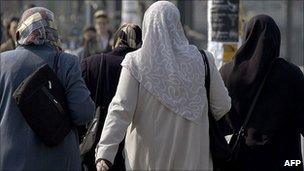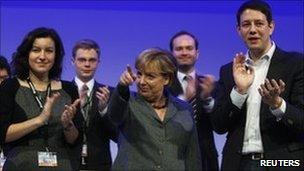Germans wrestle with multicultural identity
- Published

In the survey, Germans were tough on the rights of other religions
What does a true German look like? Or rather, what do Germans think a true German looks like?
The question is at the core of a debate which simmers - and occasionally boils over - as Germany tries to define itself in an age of migration.
Gunter Piening, for example, thinks his blond hair and blue eyes make him the picture of German-ness - but he doesn't like that perception.
He is Berlin's Commissioner for Integration and Migration, and he told the BBC: "A lot of people think that 'German' is an ethnic category - that Germans are blond and blue eyed."
His department is waging a publicity campaign to show different faces of Germany - without blond hair and blue eyes.
"Too late, we have started to think about what our society is," he said.
Comparing Germany to Britain, he added: "Maybe one reason is that Great Britain was part of an empire so the British have had long, long experience dealing with different groups from all over the world.
"We have problems with people accepting that a modern society is ethnically diverse. Maybe that is a difference to Great Britain or France or an immigration society like the United States."

Gunter Piening is trying to widen the public perception of a typical German citizen
He says he has a friend of Indian background who is a successful businessman.
When that friend is in Britain he feels like a part of a successful, middle-class establishment, but when he comes to Berlin he feels like an outsider, Mr Piening says.
"One difference is that immigrants are represented in Britain in the media. They are visible in the middle class," he said.
"Here in Germany if there are images of Turkish people in the media it is connected to poverty, to violence, to problems with integration."
Mr Piening's angst about integration comes as Germany is undergoing a period of deep introspection about its identity.
President Christian Wulff said recently: "Islam is part of Germany."
That prompted Chancellor Angela Merkel to say that "multiculti" - she used the slightly disparaging term for multiculturalism - had "failed, utterly failed".
On top of that, the best-selling non-fiction book in Germany since the war is a strong argument that Germany is destroying itself by immigration.
The book "Deutschland schafft sich ab" (Germany Does Itself In) is a rip-roaring success but it is hard to know how the complex idea of identity is playing out in German hearts.

Angela Merkel said Germany had "kidded itself" multiculturalism was working
One clue comes in a recent piece of research conducted by the University of Munster's Centre for Religion and Politics, external.
It carried out rigorous surveys of opinion in five European countries - Germany (eastern and western separately), Denmark, Holland, Portugal and France.
In all five, there was a strong general view that all religions should be respected - though slightly lower in Germany than the others.
But on the specific rights of adherents of other religions, particularly Muslims, Germans were much tougher.
Most Dutch, French and Danish people thought positively of Muslims (62%, 56% and 55% respectively) but only 34% of western Germans did and 26% eastern Germans.
Only 49% in West Germany and 53% in East Germany thought all religious groups should have equal rights - in contrast to 72% in Denmark, 82% in the Netherlands, 86% in France and 89% in Portugal.
In the west of Germany, fewer than 30% were in favour of mosques being built - compared to 20% in the east of the country.
By contrast, more than half of those polled in Denmark were for the building of mosques, about two-thirds in France and the Netherlands, and nearly three-quarters in Portugal.
It should be said that researchers chose these countries because they are among the more tolerant in Europe. Other surveys show that as you move east from Germany, the indicators of intolerance rise.
And they also said that tolerance rose according to contacts with Muslims.
One of the researchers, Alexander Yendell, told the BBC: "Germans have less contact with Muslims than the French, the Dutch and the Danes and we also found that if Germans have contacts with Muslims, they find them pleasant.
"If you have contacts, you are more likely to have a positive view of Muslims."
All of this plays against an economic backdrop of skill shortages and also the realities of life. Whatever Germans might feel, the fact is that there are substantial numbers of people in the country who do not have blonde hair and blue eyes.
According to the latest figures, 10% of German citizens have an immigrant background.
And as ideas bump up against realities on the ground, adaptation occurs.
A matter of blood
Laws change. It is nearly 50 years since Turkish workers were invited to come and work - but then return.
German citizenship then was a matter of blood - German parents had German children so outsiders couldn't break in.
But that has changed to allow in-comers to take citizenship, though they have to choose between the country of their birth and Germany - no dual citizenship.
Some stick with the old even after decades in the new. Sahes Tascıoglu has a shop where she makes magnificent bridal dresses in Berlin. She came to Germany at the age of 14 in 1969 with her father who got a job making cars in Tubingen.
She is now a classic divided person, still a Turkish citizen even though she has spent 40 years in Germany.
So, will she return to the country she has been out of for three-quarters of her life?
"I'm still here", she says. "And as along as I can work, I'll be here."
But she added: "I don't feel I'm at home in Germany. I'm a foreigner and I'll remain a foreigner."

- Published9 November 2010
- Published17 October 2010
- Published17 October 2010
- Published9 September 2010
- Published3 October 2010